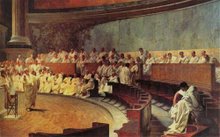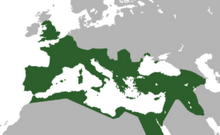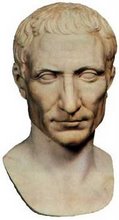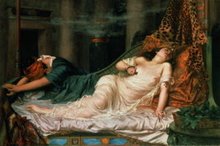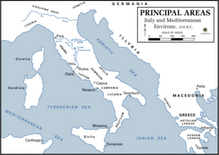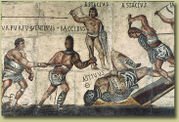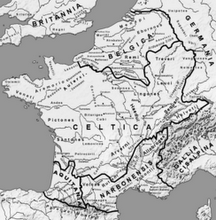- http://en.wikipedia.org/wiki/Image:Virgil_Solis_-_Deification_Caesar.jpg
- http://en.wikipedia.org/wiki/Julius_Caesar
- http://en.wikipedia.org/wiki/Roman_Republican_civil_wars
- http://www.youtube.com/watch?v=oVx3UNWnSi4
- http://www.youtube.com/watch?v=Hi_orRYNkrU
- http://www.youtube.com/watch?v=ew4-Mlyjvkk&mode=related&search=
- http://www.grisel.net/images/greece/Octavian.JPG
- http://www.cottontown.org/Nimoi/sites/CT/resources/OCTAVIAN_OBV.jpg
- http://www.youtube.com/watch?v=X0ioYQECv-s
- http://www.youtube.com/watch?v=WJ5YP9PSpwg
Tuesday, April 10, 2007
Websites Used:
Historical Images

The Deification of Julius Caesar. The Ides or March, in which the sixty members of the Senate, including Brutus, Cassius, and Servilius Casca assassinated the caesar. These men referred to themselves as the Liberatores, or the "liberators."

A statue of Julius Caesar's great nephew, Octavius Caesar, who would later become Imperator Caesar divi filius Augustus, or Augustus.

A Roman coin minted with the face of Augustus.
Media
A historical documentary on the life and accomplishments of Gaius Julius Caesar. This video is split into two segments. Both are above.
"Caesar and Cleopatra" - 1945
A trailer to the 1945 movie, "Caesar and Cleopatra," in which the affairs of Julius Caesar and Cleopatra are portrayed. This includes the time Julius Caesar spent in Egypt after defeating Pompey and the birth of Caeserion with Cleopatra.
A montage video of collected images of sculptures of Augustus with an interesting soundtrack. The song played during the video could possibly be relevant to Augustus, as some people believe that he manipulated himself into power, which could be seen as a form of arrogance.
A historical documentary on Imperator Nero.
Term Wikis
First Servile War (135-132 BC)- The First Servile War was a slave revolt in Roman city of Sicily. The revolt was led by a former slave, Eunus, who claimed to be a prophet. His lieutenant was a Cicilian named Cleon, and was a man of great ability. Most of Eunus' victories are attributed to Cleon and his abilities.
The Second Servile War (104-103 BC)- The Second Servile War was another slave uprising on the island of Siciliy. The slaves were united under Athenion and Tryphon. A consul of the Roman army Manius Aquilius put down the revolt.
Social War (91-88 BC)- known as the Social War, or Italian War, or Marsic War. The Roman Republic owned many Italian city states. While under Roman rule they were required to send troops or pay money to Rome. Usually, Rome would split conquered lands and booty with these city states because of their input. However, in the 2nd century BC Rome began to keep all their wealth and conquered lands for Rome alone, and the city states began to Revolt. The Social War was also caused in part by the assasination of Livius Druscus. Druscus' reforms would have granted the allied states Roman citizenship and therefore a say in policy. The 8 revolting allies called themselves Italia and set up a capital at Corfinium. They had 100,000 troops when the battle began. The Roman state fought and took back state by state granting them citizenship if they helped defeat the rest of then revolting states. The last state to hold out was the Samnites.
Venusia- ancient city of Apulia, Italy was the only italian state not to revolt during the Social War.
Sulla's first civil war (88-87 BC)- Sulla's first civil war was fought between Lucius Cornelius Sulla supporters and Gaius Marius' forces. Marius' forces were victorious.
Lucius Cornelius Sulla (138-78 BC)- Roman general and dictator with cunning attributes. He marched on Rome twice and after enjoying a brief period as dictator, gave the power back to the republic.
Full Biography http://en.wikipedia.org/wiki/Lucius_Cornelius_Sulla
Gaius Marius (157-86 BC)- Roman general, also politician who was elected seven times as consul. Known for reforms of the Roman Army and organizing legions into separate cohorts.
Full Biography http://en.wikipedia.org/wiki/Gaius_Marius
Sertorius' Revolt in Hispania (83-72 BC)- Sertorius' Revolt in Hispania was the sixth civil war to hit Rome. The provinces of Hispania revolted under leadership of Sertorius. Sertorius was very succesful in destroying and conquering Roman states. He defeated both Pompey and Metellus, and with ties to Cicilian pirates. He was beginning to set up slave revolts in Italy but jealousy in his ranks led to his assasination.
More Info http://en.wikipedia.org/wiki/Sertorius%27_revolt_in_Hispania
Sulla's Second Civil War (82-81 BC)- Sulla's Second Civil War against Gaius Marius' supporters lasted only one year. Sulla was victorious.
The Third Servile War (73-71 BC)- also called the Third Servile War, The Gladiator War, and the War of Spartacus, was the greatest of the three civil wars. The roman army led by Marcus Licinius Crassus finally crushed the rebellion. The war started with 70 escaped gladiator slaves, which grew into 120,000 slaves. The wandering slaves raided the city of Italia under the famous gladiator Spartacus. When the rebellion was put down, generals Pompey and Crassus used their success in the wars and popularity to further their political careers. This greatly effected the overall history of Rome.
Catiline Conspiracy (63-62 BC)- Dissatisfied followers of Lucius Sergius Catilina waged war against the senate. Catiline wanted to overthrow the aristocratic senate. The senate overcame this rebellion.
Full Biography http://en.wikipedia.org/wiki/Catiline_Conspiracy
Caesar's Civil War (49-45 BC)- One of the last wars against the Roman Republic, Caesar's Civil War were military and political confrontations between Julius Caesar, his political supporters, and his legions against teh conservative Roman Senate. The allied Roman Senate consisted of the Optimates, who were supported by Pompey's Legions. After 5 years of wars including battles in Italia, Greece, Egypt, Africa, and Hispania, Caesar defeated the last of the traditional Roman Senate at the Battle of Munda. Some historians believe this civil war and Caesar's short dictatorship before his assasination marked the true end of the Roman Republic. Including the War of the First Triumverate, this marked the beginning of Roman Empires.
Battle of Munda- took place March 17, 45 BC. The plains of Munda, southern Spain held the last battle of Caesar's Civil War. With the death of Titus Labienus and Pompey's oldest son Gnaeus Pompeius, Caesar could return to Rome as dictator.
Full Battle http://en.wikipedia.org/wiki/Battle_of_Munda
Wars of the First Triumvirate (60 - 54 bc) was a fight for control of Rome. A Fight between Julius Caesar and Pompeius Magnus erupted for control of Rome. When the third unit of teh Triumvirate Crassus died after the battle of Carrhae the state was conflicted of whether Caesar or Pompey should control Rome. In 49 bc, the senate, backing Pompey, ordered Caesar to disband his army and give up his province of Gaul. Caesar instead crossed the Rubicon river setting off a civil war. After a five year struggle across many battlefields, Caesar defeated his enemies and became sole ruler of Rome.
Julius Caesar- Roman military leader, dictator, and historian whose military conquest of Gaul extended the Roman Empire to the Atlantic Ocean.
See full Biography www.lbdb.com/TMDisplayLeader.cfm?PID=5194&WID=66
Pompeius Magnus- Roman general and Politician during the First Civil War
Full Biography www.lbdb.com/TMDisplayLeader.cfm?PID=5249&WID=66
Crassus- Roman General and politician. Third unit of the Triumvirate with Caesar and Pompey.
See full biography www.lbdb.com/TMDisplayLeader.cfm?PID=5594&WID=66
Gaul- the region of Western Europe including Italy, France, Belgium, western Switzerland, parts of the Netherlands and Germany.
Rubicon River- ancient Latin name for the small river in Northern Italy. Crossing the Rubicon, or "point of no return", declared Caesars act of war.
Carrhae- small town near present day Turkey, the site of the battle between Crassus and Parthian Empire in 53 BC. The Parthian Empire under Spahbod Surena was victorious.
Post-Caesarian Civil war (44 BC)- Civil War between the Senate, led by Cicero and later Octavian), against the army of Marc Antony and Lepidus. The war ended in a truce and the unification of the forces.
Liberators' Civil War (44-42 BC)- war between the Second Triumvirate and the Liberators. The Liberators consisted of Caesar's assassins Brutus and Cassius. The war ended in Triumvirate victory.
Full War http://en.wikipedia.org/wiki/Liberators%27_civil_war
Second Triumvirate- official alliance of Octavius, Marc Antony, and Lepidus
History http://en.wikipedia.org/wiki/Second_Triumvirate
Sicilian Revolt (44-36 BC)- The Second Triumvirate versus Sextus Pompeius. Eight year war resulted in Triumvirate victory.
Sextus Pompeius Magnus Pius- Roman general during the late Republic was the last opposition to the Second Triumvirate. Youngest son of Pompey the Great, fled to Egypt with his father after Caesar defeated them in Ceasar's Civil War. Returned home to ally with his brother Gnaeus to oppose Caesar again. After defeat, his brother was executed but he escaped to Sicily. Having a long time to build a massive resistance in Sicily, peace was finally signed with the Second Triumvirate in 39 BC with the Pact of Misenum.
Misenum- ancient port Campania, Southern Italy.
Fulvia's Civil War (41-40 BC)- The forces of Lucius Antonius and Fulvia Antonia versus Octavian. Octavian came out the victor.
Fulvia Antonia- wife of Marc Anthony at the time
Full Biography http://en.wikipedia.org/wiki/Fulvia
Final War of The Roman Republic (32-30 BC)- also known as Antony's Civil War, was fought between Cleopatra backed by Marc Antony versus Octavian and the Western provinces. After Marc Antony betrayed Rome for Egypt and his lover, Cleopatra, he helped attack Rome. After a great victory at Actium, Octavian chased them back to Alexandria. Octavian attacked the city until both Marc Antony and Cleopatra committed suicide. With the end of this war, Octavian brought peace to a century of civil wars. The Roman World declared him Augustus in 27 BC.
Battle of Actium (31 BC)- main conflict of the Antony Octavian civil war was fought on September 2, 31 BC. Fought at the Greek city of Actium, the end of this battle began the Roman Empire.
Pax Romana- Latin for Roman Peace lasted from 27 BCE until 180 CE. This was the longest period of relative peace enjoyed by the Roman Empire.
The Second Servile War (104-103 BC)- The Second Servile War was another slave uprising on the island of Siciliy. The slaves were united under Athenion and Tryphon. A consul of the Roman army Manius Aquilius put down the revolt.
Social War (91-88 BC)- known as the Social War, or Italian War, or Marsic War. The Roman Republic owned many Italian city states. While under Roman rule they were required to send troops or pay money to Rome. Usually, Rome would split conquered lands and booty with these city states because of their input. However, in the 2nd century BC Rome began to keep all their wealth and conquered lands for Rome alone, and the city states began to Revolt. The Social War was also caused in part by the assasination of Livius Druscus. Druscus' reforms would have granted the allied states Roman citizenship and therefore a say in policy. The 8 revolting allies called themselves Italia and set up a capital at Corfinium. They had 100,000 troops when the battle began. The Roman state fought and took back state by state granting them citizenship if they helped defeat the rest of then revolting states. The last state to hold out was the Samnites.
Venusia- ancient city of Apulia, Italy was the only italian state not to revolt during the Social War.
Sulla's first civil war (88-87 BC)- Sulla's first civil war was fought between Lucius Cornelius Sulla supporters and Gaius Marius' forces. Marius' forces were victorious.
Lucius Cornelius Sulla (138-78 BC)- Roman general and dictator with cunning attributes. He marched on Rome twice and after enjoying a brief period as dictator, gave the power back to the republic.
Full Biography http://en.wikipedia.org/wiki/Lucius_Cornelius_Sulla
Gaius Marius (157-86 BC)- Roman general, also politician who was elected seven times as consul. Known for reforms of the Roman Army and organizing legions into separate cohorts.
Full Biography http://en.wikipedia.org/wiki/Gaius_Marius
Sertorius' Revolt in Hispania (83-72 BC)- Sertorius' Revolt in Hispania was the sixth civil war to hit Rome. The provinces of Hispania revolted under leadership of Sertorius. Sertorius was very succesful in destroying and conquering Roman states. He defeated both Pompey and Metellus, and with ties to Cicilian pirates. He was beginning to set up slave revolts in Italy but jealousy in his ranks led to his assasination.
More Info http://en.wikipedia.org/wiki/Sertorius%27_revolt_in_Hispania
Sulla's Second Civil War (82-81 BC)- Sulla's Second Civil War against Gaius Marius' supporters lasted only one year. Sulla was victorious.
The Third Servile War (73-71 BC)- also called the Third Servile War, The Gladiator War, and the War of Spartacus, was the greatest of the three civil wars. The roman army led by Marcus Licinius Crassus finally crushed the rebellion. The war started with 70 escaped gladiator slaves, which grew into 120,000 slaves. The wandering slaves raided the city of Italia under the famous gladiator Spartacus. When the rebellion was put down, generals Pompey and Crassus used their success in the wars and popularity to further their political careers. This greatly effected the overall history of Rome.
Catiline Conspiracy (63-62 BC)- Dissatisfied followers of Lucius Sergius Catilina waged war against the senate. Catiline wanted to overthrow the aristocratic senate. The senate overcame this rebellion.
Full Biography http://en.wikipedia.org/wiki/Catiline_Conspiracy
Caesar's Civil War (49-45 BC)- One of the last wars against the Roman Republic, Caesar's Civil War were military and political confrontations between Julius Caesar, his political supporters, and his legions against teh conservative Roman Senate. The allied Roman Senate consisted of the Optimates, who were supported by Pompey's Legions. After 5 years of wars including battles in Italia, Greece, Egypt, Africa, and Hispania, Caesar defeated the last of the traditional Roman Senate at the Battle of Munda. Some historians believe this civil war and Caesar's short dictatorship before his assasination marked the true end of the Roman Republic. Including the War of the First Triumverate, this marked the beginning of Roman Empires.
Battle of Munda- took place March 17, 45 BC. The plains of Munda, southern Spain held the last battle of Caesar's Civil War. With the death of Titus Labienus and Pompey's oldest son Gnaeus Pompeius, Caesar could return to Rome as dictator.
Full Battle http://en.wikipedia.org/wiki/Battle_of_Munda
Wars of the First Triumvirate (60 - 54 bc) was a fight for control of Rome. A Fight between Julius Caesar and Pompeius Magnus erupted for control of Rome. When the third unit of teh Triumvirate Crassus died after the battle of Carrhae the state was conflicted of whether Caesar or Pompey should control Rome. In 49 bc, the senate, backing Pompey, ordered Caesar to disband his army and give up his province of Gaul. Caesar instead crossed the Rubicon river setting off a civil war. After a five year struggle across many battlefields, Caesar defeated his enemies and became sole ruler of Rome.
Julius Caesar- Roman military leader, dictator, and historian whose military conquest of Gaul extended the Roman Empire to the Atlantic Ocean.
See full Biography www.lbdb.com/TMDisplayLeader.cfm?PID=5194&WID=66
Pompeius Magnus- Roman general and Politician during the First Civil War
Full Biography www.lbdb.com/TMDisplayLeader.cfm?PID=5249&WID=66
Crassus- Roman General and politician. Third unit of the Triumvirate with Caesar and Pompey.
See full biography www.lbdb.com/TMDisplayLeader.cfm?PID=5594&WID=66
Gaul- the region of Western Europe including Italy, France, Belgium, western Switzerland, parts of the Netherlands and Germany.
Rubicon River- ancient Latin name for the small river in Northern Italy. Crossing the Rubicon, or "point of no return", declared Caesars act of war.
Carrhae- small town near present day Turkey, the site of the battle between Crassus and Parthian Empire in 53 BC. The Parthian Empire under Spahbod Surena was victorious.
Post-Caesarian Civil war (44 BC)- Civil War between the Senate, led by Cicero and later Octavian), against the army of Marc Antony and Lepidus. The war ended in a truce and the unification of the forces.
Liberators' Civil War (44-42 BC)- war between the Second Triumvirate and the Liberators. The Liberators consisted of Caesar's assassins Brutus and Cassius. The war ended in Triumvirate victory.
Full War http://en.wikipedia.org/wiki/Liberators%27_civil_war
Second Triumvirate- official alliance of Octavius, Marc Antony, and Lepidus
History http://en.wikipedia.org/wiki/Second_Triumvirate
Sicilian Revolt (44-36 BC)- The Second Triumvirate versus Sextus Pompeius. Eight year war resulted in Triumvirate victory.
Sextus Pompeius Magnus Pius- Roman general during the late Republic was the last opposition to the Second Triumvirate. Youngest son of Pompey the Great, fled to Egypt with his father after Caesar defeated them in Ceasar's Civil War. Returned home to ally with his brother Gnaeus to oppose Caesar again. After defeat, his brother was executed but he escaped to Sicily. Having a long time to build a massive resistance in Sicily, peace was finally signed with the Second Triumvirate in 39 BC with the Pact of Misenum.
Misenum- ancient port Campania, Southern Italy.
Fulvia's Civil War (41-40 BC)- The forces of Lucius Antonius and Fulvia Antonia versus Octavian. Octavian came out the victor.
Fulvia Antonia- wife of Marc Anthony at the time
Full Biography http://en.wikipedia.org/wiki/Fulvia
Final War of The Roman Republic (32-30 BC)- also known as Antony's Civil War, was fought between Cleopatra backed by Marc Antony versus Octavian and the Western provinces. After Marc Antony betrayed Rome for Egypt and his lover, Cleopatra, he helped attack Rome. After a great victory at Actium, Octavian chased them back to Alexandria. Octavian attacked the city until both Marc Antony and Cleopatra committed suicide. With the end of this war, Octavian brought peace to a century of civil wars. The Roman World declared him Augustus in 27 BC.
Battle of Actium (31 BC)- main conflict of the Antony Octavian civil war was fought on September 2, 31 BC. Fought at the Greek city of Actium, the end of this battle began the Roman Empire.
Pax Romana- Latin for Roman Peace lasted from 27 BCE until 180 CE. This was the longest period of relative peace enjoyed by the Roman Empire.
Subscribe to:
Comments (Atom)
